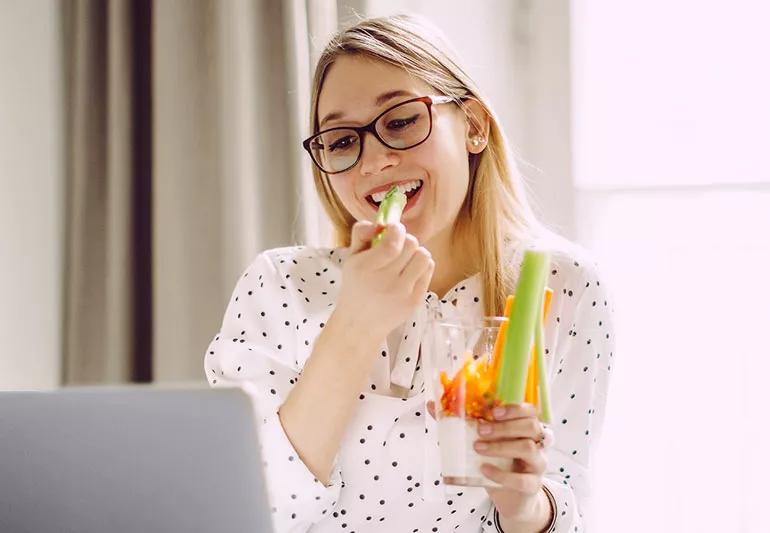Plus 10 dietitian-approved snacks

It’s 3 o’clock and your stomach is rumbling. No possible way you’re making it to dinner. While it’s tempting to make a vending machine run or rummage around mindlessly in the fridge, snacking is (yet another of those) things in life where a little advanced planning pays off big.
Advertisement
Cleveland Clinic is a non-profit academic medical center. Advertising on our site helps support our mission. We do not endorse non-Cleveland Clinic products or services. Policy
To keep your weight in check, healthy food choices matter. And that includes all of the food you eat, says dietitian Mira Ilic, RD, LD. Your carefully planned diet can go astray if you’re unwise in the snacking department.
“I recommend a Mediterranean way of eating in general — for both meals and snacks,” Ilic advises.
After all, about 90% of Americans snack between meals, according to the National Health and Nutrition Examination Survey. That’s not necessarily a bad thing, as long as you follow these simple guidelines.
Choose nutrient-dense snack foods. Why? It’s because snacks that combine protein, high-fiber carbs and healthy fats are nourishing. That means they’ll keep you feeling full longer.
Protein can come from both plant and animal sources (if you eat it). And you’ll find healthy fats in avocado, olive oil, nuts, nut butter, seeds (like chia or flax) and fish.
So fruits and veggies should be a large part of what you’re snacking on, Ilic says. Unlike many snacks, they’re not just empty calories. They have nutrients and antioxidants, and some have anti-inflammatory properties. (Bonus!)
But knowing which foods to avoid is just as important as those to choose. Stay away from sugary foods, processed foods made with white flour (which are inflammatory), and foods high in sodium. Saturated fats and trans fats can also promote inflammation.
Be sure to read food labels. Yogurt itself is a fine pick. But it can be unhealthy if it contains lots of sugar. If you buy the flavored variety, find one with less than 10 grams of sugar, she suggests.
Advertisement
Well-timed snacks can help to keep you from overeating at meal time.
For example, it’s actually a good idea to get that 3 p.m. snack to tide you over from lunch until dinner.
If you run out the door in the morning with no thought to what you’ll snack on that day, there’s a good chance you’ll regret it later.
It’s too easy to grab a bag of potato chips or a sugar-laden power bar masquerading as a healthy snack when you’re ravenous. These options tend to be high in calories and loaded with added sugar, salt and bad-for-you fats.
The solution? Pack your own snacks each morning (or the night ahead) in a small container or small snack bag. Aim for about one-quarter to one-third of a cup.
Here are 10 healthy snacks ideas that Ilic recommends to get you started:
Advertisement
Learn more about our editorial process.
Advertisement

This color additive, found in many pre-packaged foods, may affect people with ADHD or allergies

With a focus on internal cues for hunger and fullness, this eating style may revolutionize your relationship with food

Review the ingredients, watch for sugar and fat, and choose one with the right amount of protein for your needs

Getting the hang of portions can help you better understand how much to put on your plate

A typical recommended balanced diet is half fruits and veggies, a quarter protein and a quarter grains

Foods high in protein, fiber and water can help keep hunger at bay

This quirky food trend is harmless, as long as you’re getting enough protein, fiber and healthy fats

With a little planning, you can fill your belly and boost your energy

Wearing a scarf, adjusting your outdoor activities and following your asthma treatment plan can help limit breathing problems

Your diet in the weeks, days and hours ahead of your race can power you to the finish line

When someone guilt trips you, they’re using emotionally manipulative behavior to try to get you to act a certain way